AgriBiz
Seri-Business: Emerging entrepreneurship model in sericulture
Published
4 years agoon
By
BK Editor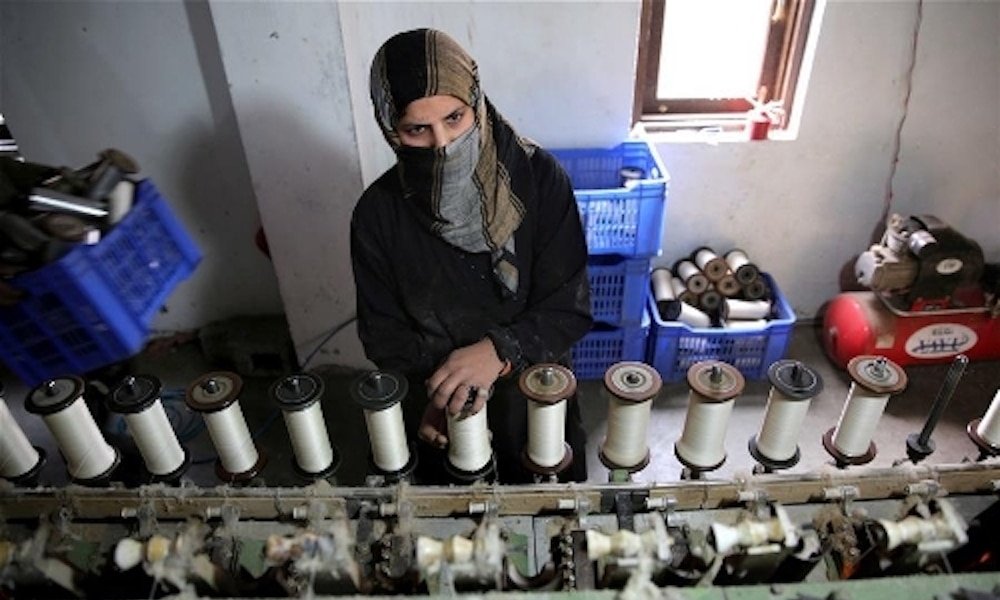
Naveed Hamid
Aina Bhat
Sericulture is one of India’s and Asia’s oldest sectors. Sericulture is a labour-intensive and commercially desirable agro-cottage, a forest-based industry that falls under the cottage and small-scale market. The end product of this industry is silk. It is particularly well suited to rural residents employed in agriculture, entrepreneurs, and artisans because it needs minimal investment.
It provides income and jobs to the rural poor, especially small-scale farmers and other vulnerable and poorer members of society. Kashmir produces Mulberry and Tasar silk in a non-traditional sericulture state. The growth of bivoltine sericulture has been a priority sector of the Indian silk industry, but progress has yet to reach the targets. One of them is sericulture.
In the state of Jammu and Kashmir, sericulture holds a special place. This is India’s only conventional Univoltine belt capable of processing silk with qualities equal to the finest imported raw silk of standard quality available on foreign markets. Silkworm rearing offers part-time jobs to around 30,000 households, in addition to providing permanent employment to 5,000 people in the public sector. Furthermore, the silk industry employs about 10,000 full-time weavers in about 2,000 private sector units in the valley. As a result, almost 2.15 million workers are employed in this sector, either full-time or part-time. Until 1988, the silk industry was a state monopoly, and farmers received no revenue from the selling of cocoons at the government-set floor price. It was given much thought as to how to reclaim its former glory. The market was de-monopolized, and plant control was passed to farmers with permission to sell surplus leaves and earn money.
The Indian silk industry is one of the largest generators of employment and foreign exchange for the country as sericulture activities spread across 52,360 villages. India enjoys a unique global position in terms of the production of all commercially useful varieties of silk. India is the second-largest producer of silk. Sericulture provided employment to over 9.1 million people in India during FY19.
The Exports of silk and silk products from India reached US$ 291.36 million in 2018-19 and US$ 243.52 million in FY20 (till December 2019). Source: CSB Banglore.
Status of Indian Sericulture Industry
| Raw Silk Production | 35,468 MT |
| Employment: | 9.2 Million |
| Size of the Industry | Rs 15,000 crores |
| Credit Flow | Rs 500 Crores |
| Export Earnings | Rs. 2100 crores |
| Raw Silk Imports | 3712 MT (Rs.1200 crores) |
SWOT ANALYSIS
Strengths
- Rich natural resources & favourable climate
- Traditional avocation (way of life), rich design
- Strong domestic demand-pull
- Rich heritage of handloom weaving & designs
- Produces all five commercial varieties of silk
Opportunities
- Adequate domestic demand for output
- Low investment & moderate returns
- High labour cost of silk production in other
- Nations give India a good opportunity
- The sector is a huge employment provider
- Availability of efficient m/c & technologies
Weaknesses
- Highly unorganized & labour-intensive sector
- Small producers and small converters
- Primitive/traditional methods/technologies
- Outdated machinery.
- Age-old designs & motifs
Threats
- Fluctuating international silk prices
- China- the ‘big brother’ is always a threat
- Inadequate resources at states’ disposal
- Heavy dependence on a single product
- Low capabilities of primary producers
- Fluctuating market demand – recession
Entrepreneurship Concept
Entrepreneurship is a mindset that involves taking calculated chances and confidence in order to achieve a specific aim. It’s a hybrid ability that combines a number of strengths and characteristics. An entrepreneur is someone that has the drive to do or manufacture something unique, organizes production, takes chances, and handles the economic insecurity that comes with owning a company. The collection of such attributes the entrepreneur possesses is called entrepreneurship.
Entrepreneurship in Sericulture
Sericulture is the discipline and practice of silk production. Agriculture and associated farm operations have traditionally been important to the Indian economy. Sericulture, as an agro-based company, has a major impact on rural people’s economic prospects.
It has the potential to generate jobs, especially in rural areas. Sericulture is a multifaceted industry that includes food plant cultivation (mulberry leaf processing), silkworm rearing (cocoon production), silkworm egg production, silk reeling (yarn production), spinning, warp and weft production, printing and dyeing, weaving (fabric production), finishing, textile design, and marketing etc. The industry encompasses a wide range of on-farm and non-farm activities, necessitating a wide range of expertise, as well as a varied population of people, and bringing people from all walks of life together to work on silk processing. Sericulture is a year-round activity with a variety of career openings. Sericulture is a low-cost, high-yielding crop that produces five to six crops per year. With minimum upkeep, the mulberry plantation will yield reliably for the next 15-20 years. India currently earns over Rs 4,000 crores from the sale of silk fabrics, waste, and garments. Aside from high export potential, silk has a strong domestic demand and a strong handloom base combined with artisan abilities, which is India’s true strength of the Indian sericulture industry.
Sericulture has a significant socioeconomic effect and has the potential to change people’s lives by creating viable and long-term job opportunities. Since it entails a variety of methods, from mulberry plantation to silkworm rearing, spinning, spinning, and selling, it employs a vast number of people, including women. Sericulture has the potential to offer gainful jobs to more than 15 Lac citizens in the state if it is encouraged on a larger scale through value addition.
The various entrepreneurial opportunities in the sericulture industry starting from leaf to fabric production are hereunder discussed:
Raising high-yielding mulberry saplings, silkworm egg preparation and supply, Chawki rearing (young age silkworm rearing), cocoon processing, silk reeling, Zari manufacturing, sericulture byproduct recycling, cocoon and silk-based handicrafts, the silk trade, cocoon crafting and Pet Food, Protein diet foods, and so on.
It is clear that the sericulture industry provides outstanding job prospects as well as a variety of entrepreneurship opportunities. Sericulture, as an agro-based company, plays a significant role in determining the economic fate of rural people and fits well into India’s rural system, where agriculture remains the primary occupation. Sericulture provides job opportunities not only for rural residents but also for skilled youth in semiurban and urban areas. Sericulture development would undoubtedly result in a thriving rural by providing income-generating entrepreneurship opportunities, thus reducing poverty and halting rural-to-urban migration.
Suggestions for boosting the Entrepreneurship in Sericulture:
- Up gradation of Departmental Nurseries/ farms to improve Mulberry saplings /leaf production
- Cocoon and Silk yarn marketing support system to the local Reelers.
- Enhancement in Cocoon Bank Revolving fund
- Infrastructure development at Farmers’ level
- Popularizing Multi cropping and green marketing
- Incentive on cocoon and silk production to farmers/reelers
- Infrastructure development/up-gradation support
- Introduction of cocoon crop insurance scheme
- Development of Integrated Silk parks.
- Silk Branding push.
- Private Sector Involvement.
- R&D from Research Institutes with Skill developments through capacity buildings.
Encouraging the young talent to take up entrepreneurship as a career (Seri-Business)
To inspire young people to engage in entrepreneurship ventures, a variety of methods have been used. Many young people today have business ideas, but only a small percentage of them have the capacity and opportunity to transform such ideas into profitable enterprises. The ability of youth to transform their inventions into businesses is critical to the future of small business start-ups. The ability to recognize an advantage and put it to use is largely dependent on the youth’s willingness to engage in such entrepreneurial practices. Participation in entrepreneurial educational programs has a strong impact on the desire to launch a new company.
To make the dream business a reality, youths need inspiration from all stakeholders, including the government, lecturers, families, friends, and religious groups, either by funding or other support mechanisms. As a result, many young people who are willing to take the risk of starting a new business are concerned about access to resources such as funding and inspiration.
Starting a Seri-Business Startup
The phases of starting a profitable company begin with identifying the motivations or commitments for starting one. After acquiring such motives, the next step is to discover a viable idea. This idea must be attractive and validated on whether it can meet customer needs. The next step is to look for the necessary resources required such as materials, source of funding and quality suppliers. The final part is to apply the plan by getting into full business and then build a professional network to sustain the venture. This model is divided into four basic success components. These factors are idea and market, motivation and determination, resources and ability.
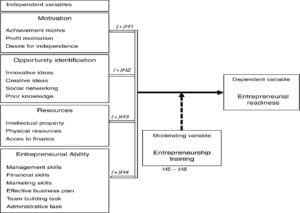

Entreprenurship activities Framework Model
You may like
-




RBI penalises Central Cooperative Banks Baramulla, Anantnag for violations
-




Editorial | J&K Budget 2025-26 – A Balancing Act
-




CII J&K Organizes Health Conclave 2024
-

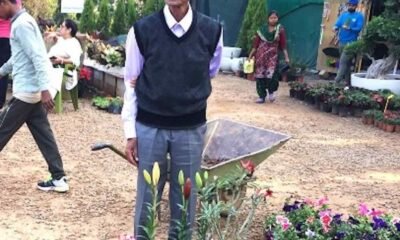


Kya kuchh tha jiske kehne ko: A tribute to father
-

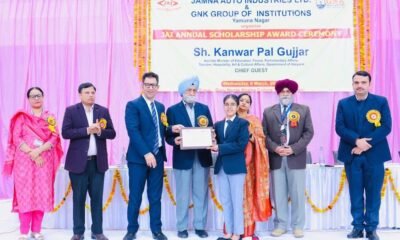


GNK hosts JAI scholarship distribution function
-

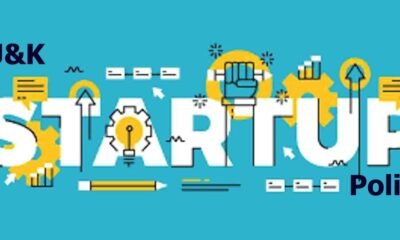


Administrative Council approves J&K Startup Policy 2024-27
AgriBiz
Building FPO Leaders: SKUAST-K, MANAGE Hyderabad complete trainers’ training
Published
7 months agoon
November 30, 2024By
BK Editor

BK News
Srinagar: The month-long Training of Trainers (ToT) program for Farmer Producer Organizations (FPOs), organised by Sher-e-Kashmir University of Agricultural Sciences and Technology of Kashmir (SKUAST-K) and Agriculture Department in collaboration with the National Institute of Agricultural Extension Management (MANAGE), Hyderabad, concluded successfully, marking a major milestone in capacity building for agricultural transformation in Jammu and Kashmir.
The program brought together some of India’s foremost agricultural business experts to train nearly 300 resource persons in eight batches. Designed under SKUAST-K’s HADP Project 20: Innovative Approaches for Promoting Agriculture in J&K, the initiative aimed to strengthen farmer organizations such as FPOs, Self-Help Groups (SHGs), Common Interest Groups (CIGs), and Primary Agricultural Credit Societies (PACS). The program covered topics like FPO formation, business planning, supply chain management, and market linkages.


Vice-Chancellor SKUAST-K, Prof Nazir Ahmad Ganai, who actively monitored the program, in his message stressed the importance of FPOs in transitioning J&K from subsistence farming to sustainable commercial agriculture. Drawing comparisons with advanced economies, he highlighted the urgent need to increase agricultural processing, which currently stands at just 2% in the region.
Prof Masood Saleem Mir, Associate Director Research and Principal Investigator of the HADP Innovative Extension Project, elaborated on the program’s objectives and logistics. “This training was designed to address the unique challenges faced by farmer organizations in J&K. By equipping participants with technical, managerial, and entrepreneurial skills, we aim to create a ripple effect where these trainers will mentor and guide farmers across the region,” he said. Prof Mir further highlighted the strategic collaboration with MANAGE Hyderabad and the Agriculture Production Department, which ensured the program’s success.
“Our aim is not just to train individuals but to build a system where farmers can access consistent support and practical solutions for their challenges. The comprehensive curriculum, covering everything from FPO formation to business sustainability, is tailored to meet the region’s specific needs,” Prof. Mir added.
The training, facilitated by MANAGE Hyderabad, featured country’s top expert in FPO formation, business planning and supply chain management. These experts provided strategic insights into FPO management, business sustainability, and innovative mobilization techniques, ensuring practical outcomes for the participants.
Participants praised the program for its practical orientation, stating that it had demystified the complexities of building successful FPOs. Many called for follow-up sessions focused on developing tailored, commodity-based business plans to enhance FPO effectiveness.
This initiative aligns with SKUAST-K’s vision to make J&K a model bioeconomy in the country, fostering a resilient and sustainable agricultural landscape. The university plans to replicate the program in the Jammu division, further extending its impact.
The event concluded with the distribution of certificates to the trainees and a pledge by all stakeholders to work collectively towards uplifting the region’s farming community.
AgriBiz
SKUAST-K innovator clinches Rs5lakh RKVY Raftaar grant
Published
2 years agoon
January 9, 2024By
BK Editor

BK News
Srinagar: An innovator from Sher-e-Kashmir University of Agricultural Sciences and Technology of Kashmir, Shaista Khan, has bagged Rs5lakh RKVY Raftaar grant for Herbodyne, an herbal toothpaste based on an indigenous Kashmir plant.
Presently pursuing PhD from the SKUAST-K’s Faculty of Forestry, Benhama campus has been awarded the grant under RKVY RAFTAAR, MANAGE, Hyderabad from Ministry of Agriculture and Farmer’s Welfare, Govt. of India. She was mentored by Prof TH Masoodi, Registrar SKUAST-K, Prof Imtiyaz Murtaza, Division of Basic Sciences and Humanities, Prof Parvez Ahmad Sofi, Prof. and Head, Div of FPU and Dr Nazir Ahmad Pala, Div of Silviculture and Agroforestry, Faculty of Forestry.
On talking to her, Shaista Khan says that it happened only due to the mentorship and support that she received from the mentors and the Faculty of Forestry, SKUAST-K. She expresses heartfelt gratitude to Prof Nazir Ahmad Ganai, VC SKUAST-K and Prof. T.H. Masoodi, Registrar SKUAST-K for providing an inspirational, motivational and unwavering support system. She also expresses her sincere thanks to her mentors Prof. T. H. Masoodi Registrar, SKUAST-K, Prof Imtiyaz Murtaza, Prof. Parvez A Sofi and Dr Nazir A Pala for their effective mentorship and for inspiring her with this innovative idea. She is also grateful to Dr Akhlaq Amin Wani, Prof.& Head, Div. of Natural Resource Management, Dr JA Mugloo, Head, KVK, Malangpora and Dr GM Bhat, Prof & Head, Silviculture and Agroforestry and other members of the faculty for their valuable support and encouragement. In addition, she says that she is very thankful to the NAHEP, SKUAST for providing financial assistance and SKIIE, SKUAST-K for their support and guidance.
AgriBiz
Vegetable Science: A Potential Area for Startups in J&K
Published
2 years agoon
December 14, 2023By
BK Editor



Dr Asima Amin Dr Baseerat Afroza Naveed Hamid
In a world grappling with the challenges of population growth, environmental sustainability, and a shifting focus towards healthier lifestyles, the potential of vegetable science in startups emerges as a beacon of transformative innovation. The intersection of agriculture, technology, and health has given rise to a myriad of opportunities for entrepreneurs to revolutionize the way we cultivate, consume, and benefit from vegetables.
As global consciousness veers towards sustainable practices and healthier food choices, startups delving into vegetable science are poised to play a pivotal role in shaping the future of our food systems. This introduction seeks to explore the diverse avenues where startups can harness the power of vegetable science to address pressing issues such as food security, nutritional health, and environmental impact.
From leveraging cutting-edge technologies in agriculture to developing novel plant-based food products, the potential applications of vegetable science are vast and impactful. This exploration encompasses not only the traditional aspects of farming and crop management but also delves into the realms of biotechnology, food technology and sustainable business practices.
We will delve into specific domains where startups can thrive, exploring how innovation in vegetable science can drive change in agribusiness, food technology, health and wellness, sustainability, and more. The goal is to unveil the untapped potential that lies within the realm of vegetable science, inspiring entrepreneurs, investors, and stakeholders to contribute to a more sustainable, nutritious, and equitable future.
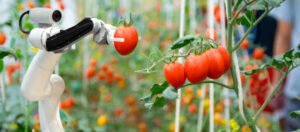

As we embark on this journey through the fertile landscape of vegetable science in startups, envision a world where the humble vegetable becomes a catalyst for transformative change, not only in our diets but in the very fabric of how we approach agriculture, technology, and the well-being of our planet.
STARTUP AREAS
Vegetable science can play a significant role in startups across various sectors, ranging from agriculture and food technology to health and sustainability. Here are some potential areas where vegetable science can contribute to startup innovations:
-
Ag-Tech Startups:
- Precision Farming: Utilize technology, sensors and data analytics to optimize vegetable cultivation, ensuring efficient resource use and higher yields.
- Vertical Farming: Develop indoor farming solutions using controlled environments, allowing year-round vegetable production in urban areas.
- Biotechnology: Explore genetic modification and breeding techniques to enhance the nutritional content, disease resistance,and overall quality of vegetables.
-
Food Technology:
- Plant-Based Alternatives: Create innovative plant-based products using vegetables to meet the growing demand for vegetarian and vegan options.
- Food Preservation: Develop technologies for extending the shelf life of vegetables, reducing food waste, and ensuring freshness during transportation.
- Nutritional Enhancement: Explore methods to fortify vegetables with additional nutrients to address specific health concerns.
-
Health and Wellness:
- Functional Foods: Develop vegetable-based products with specific health benefits, such as anti-inflammatory, antioxidant or immune-boosting properties.
- Nutraceuticals: Investigate the medicinal properties of vegetables and create supplements or health products based on their natural compounds.
-
Sustainability:
- Circular Economy: Implement sustainable practices in vegetable production, such as recycling agricultural waste, utilizing organic fertilizers, and adopting eco-friendly packaging.
- Zero-Waste Solutions: Develop technologies to utilize every part of vegetables, minimizing waste and creating by-products for various applications.
-
Smart Farming and IoT:
- Smart Sensors: Integrate sensors to monitor soil conditions, water levels, and plant health, allowing farmers to make data-driven decisions for optimized crop management.
- IoT in Supply Chain: Implement IoT technologies to track and monitor vegetables throughout the supply chain, ensuring quality, reducing losses, and enhancing traceability.
-
Education and Consulting:
- Agribusiness Consulting: Startups can provide consultancy services to farmers on adopting modern vegetable cultivation techniques, sustainable practices, and technology integration.
- Educational Platforms: Develop online platforms to educate farmers, entrepreneurs, and consumers about the latest advancements in vegetable science, sustainable agriculture, and healthy eating.
-
Community and Social Impact:
- Community Gardens: Startups can facilitate community-based vegetable gardens, promoting local produce, community engagement, and sustainable agriculture practices.
- Social Enterprises: Combine vegetable science with social impact by addressing issues like food insecurity, promoting fair trade, and supporting local farmers.
IMPACT OF STARTUPS IN VEGETABLE SCIENCE
The potential of vegetable science in startups offers a range of benefits that extend beyond economic success. These ventures can positively impact various sectors and address pressing global challenges. Here are some key benefits:
-
Sustainable Agriculture:
- Resource Efficiency: Startups can develop technologies and practices that optimize resource use, such as water, fertilizers, and land, contributing to sustainable and environmentally friendly agriculture.
- Reduced Environmental Impact: By promoting organic farming, minimizing chemical pesticide use, and adopting eco-friendly practices, vegetable science startups can contribute to reducing the environmental footprint of agriculture.
-
Innovation in Crop Management:
- Increased Yields: Precision farming technologies and genetic modifications can lead to higher crop yields, addressing the growing demand for food in a world with an expanding population.
- Disease Resistance: Genetic modifications can enhance the resistance of vegetables to pests and diseases, reducing the reliance on chemical pesticides and promoting healthier crops.
-
Health and Nutrition:
- Improved Nutritional Content: Biotechnological advancements can be harnessed to enhance the nutritional content of vegetables, providing consumers with healthier and more nutrient-rich food options.
- Functional Foods: Startups focusing on functional foods can contribute to improved public health by developing vegetable-based products with specific health benefits.
-
Economic Opportunities:
- Job Creation: The growth of vegetable science startups can lead to job creation across various sectors, including agriculture, technology, research, and product development.
- Market Expansion: Innovations in vegetable-based products can open up new markets and cater to the increasing demand for sustainable and plant-based alternatives.
-
Food Security and Accessibility:
- Year-Round Production: Vertical farming and controlled environment agriculture enable year-round vegetable production, reducing dependence on seasonal harvests and improving food security.
- Localized Farming: Community-based initiatives and startups focused on local farming contribute to localized food production, reducing the need for extensive transportation and storage.
-
Technological Advancements:
- Smart Farming: Integration of technology in agriculture, such as smart sensors and IoT devices, leads to more efficient and data-driven farming practices, improving overall productivity.
- Traceability and Transparency: Technologies for supply chain traceability enhance transparency in the food production process, building consumer trust and meeting the demand for ethically sourced products.
-
Community Engagement and Social Impact:
- Community Empowerment: Initiatives like community gardens and social enterprises create opportunities for community engagement, fostering a sense of empowerment and ownership among local populations.
- Addressing Food Insecurity: Socially focused startups can play a role in addressing food insecurity by promoting sustainable and affordable vegetable production methods.
-
Education and Awareness:
- Knowledge Dissemination: Educational platforms and consulting services contribute to disseminating knowledge about sustainable agriculture practices, technology adoption, and healthy eating habits.
- Empowering Farmers: Agribusiness consulting services empower farmers with the knowledge and tools to adopt modern practices, improving their livelihoods and the sustainability of their operations.
Conclusion
The potential of vegetable science in startups holds tremendous promise and presents exciting opportunities for innovation, sustainability, and societal impact. As the world grapples with challenges such as food security, environmental sustainability, and public health, leveraging the power of vegetable science can pave the way for transformative solutions.
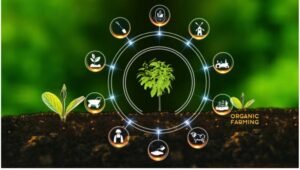

Startups focusing on vegetable science can contribute significantly to agricultural advancements by developing resilient and high-yielding vegetable varieties through breeding techniques, genetic engineering and precision agriculture. This not only addresses global food demand but also aids in the conservation of resources, reduction of environmental impact, and mitigation of climate change.
Furthermore, the integration of cutting-edge technologies, such as artificial intelligence, robotics, and data analytics, into vegetable science can enhance crop monitoring, optimize resource utilization, and streamline supply chain processes. This not only increases efficiency but also opens new avenues for automation and smart farming practices.
The nutritional value of vegetables also plays a crucial role in promoting public health and wellness. Startups can explore innovative approaches to enhance the nutritional content of vegetables, develop functional foods, or create new plant-based products to meet the growing demand for healthy and sustainable diets.
Moreover, the rise of alternative protein sources, including plant-based proteins derived from vegetables, presents a unique opportunity for startups to contribute to the burgeoning market of sustainable protein options. By developing novel processing techniques and improving the taste and texture of plant-based products, these startups can cater to the increasing consumer preference for environmentally friendly and ethical food choices.
In Nutshell, the convergence of vegetable science, technology, and entrepreneurship holds the potential to revolutionize the agriculture and food industry. Startups that embrace this intersection can not only drive economic growth but also make significant contributions to addressing some of the most pressing challenges facing our planet. As the world continues to recognize the importance of sustainable and nutritious food systems, vegetable science startups stand at the forefront of creating a more resilient, efficient, and healthier future for all.
SKUAST K under the ambit of SKUAST K Innovation, Incubation & Entrepreneurship Centre is always ready to support new young minds or budding entrepreneurs who wish to start their enterprises or have some novel or great ideas to take it forward to convert them into minimum viable products or technologies in vegetable science field can come and take advantage of this Centre situated in SKUAST K main campus Shalimar.
The authors are faculty at SKUAST-K


RBI penalises Central Cooperative Banks Baramulla, Anantnag for violations


Editorial | J&K Budget 2025-26 – A Balancing Act


Building FPO Leaders: SKUAST-K, MANAGE Hyderabad complete trainers’ training


CII J&K Organizes Health Conclave 2024


SKUAST-K to hold mega Science Summit on Aug 23-24


Haryana Biodiversity Board commemorates International Biodiversity Day at GNK Group Of Institutions


Kya kuchh tha jiske kehne ko: A tribute to father


GNK hosts JAI scholarship distribution function


Administrative Council approves J&K Startup Policy 2024-27


How to begin investing
Trending
-

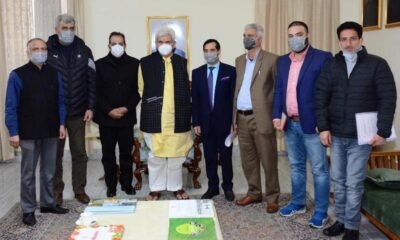

 Industry4 years ago
Industry4 years agoFCIK hails LG Sinha for creating entrepreneur-friendly industrial ecosystem
-



 Economy2 years ago
Economy2 years agoGlobal eCommerce boom and local traders of Kashmir
-

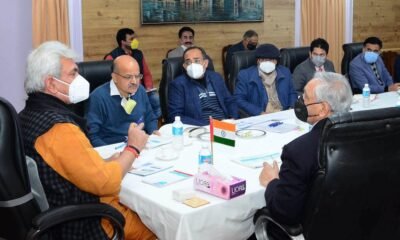

 Energy4 years ago
Energy4 years agoLt Governor discusses J&K power scenario with experts
-

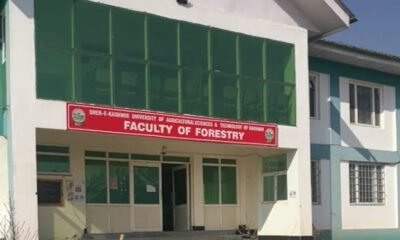

 Infra4 years ago
Infra4 years agoSKUAST-K bags EU project for urban green infrastructure
-

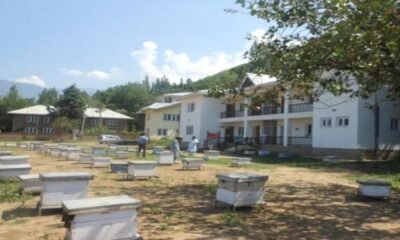

 AgriBiz4 years ago
AgriBiz4 years agoSKUAST-K to set up 3 honey testing labs in Kashmir
-

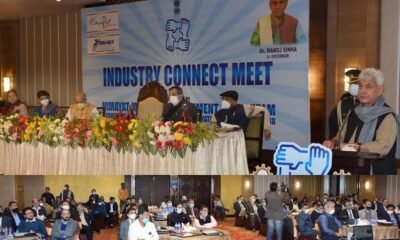

 Jobs5 years ago
Jobs5 years agoJ&K Govt holds Industry Connect Meet-Himayat 2020
-

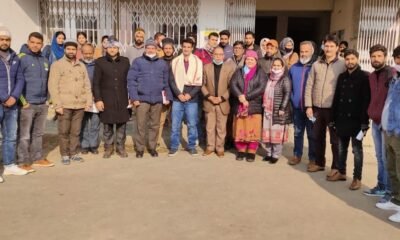

 Careers5 years ago
Careers5 years agoSKUAST-K holds career counselling at Wadura campus
-



 Industry5 years ago
Industry5 years agoImran Murtaza takes oath as president Industrial Association Khunmoh

